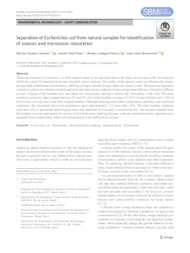Separation of Escherichia coli from natural samples for identification of sources and microcosm inoculation.
Separation of Escherichia coli from natural samples for identification of sources and microcosm inoculation.
Author(s): CARNEIRO, M. T.; PEREZ, D. V.; FEITOSA, R. C.; WASSERMAN, J. C.
Summary: Obtaining uncultured Escherichia coli from natural waters is an important step in the study of microbes in the environment, which are critical for bacterial decay and microbial source tracking. The quality of the samples used can influence the assays, because high contaminant concentrations, differing cell ages, and physiologic states can impair results. The proposed separation is based on a three-step filtration method applied to replicates of seven samples from a sewage plant affluent, collected in different periods. Aliquots of the leachate were inoculated into microcosms, aiming to observe the cultivability of the cells. The assay resulted in colimetry values ranging between 104 and 105 cells. In the leachate, averages of 1.05% of total coliforms and 1.10% of Escherichia coli were recovered from original samples. Although enduring unfavorable temperatures, salinities, and nutritional conditions, the inoculated microcosm populations grew approximately 310 times after 24 h. The final leachate contained cultivable cells in appropriate physiological states and quantities for inoculum in microcosm sets. The bacteria obtained from the leachate were also appropriate for surveys of microbial source tracking, because, in the developed procedure, organisms were separated from contaminants, while cell concentrations were sufficient for inocula.
Publication year: 2020
Types of publication: Journal article
Unit: Embrapa Soils
Keywords: Bactéria, Escherichia Coli, Rastreamento, Strains, Wastewater, Águas Residuais
Observation
Some of Embrapa's publications are published as ePub files. To read them, use or download one of the following free software options to your computer or mobile device. Android: Google Play Books; IOS: iBooks; Windows and Linux: Calibre.
Access other publications
Access the Agricultural Research Database (BDPA) to consult Embrapa's full library collection and records.
Visit Embrapa Bookstore to purchase books and other publications sold by Embrapa.

